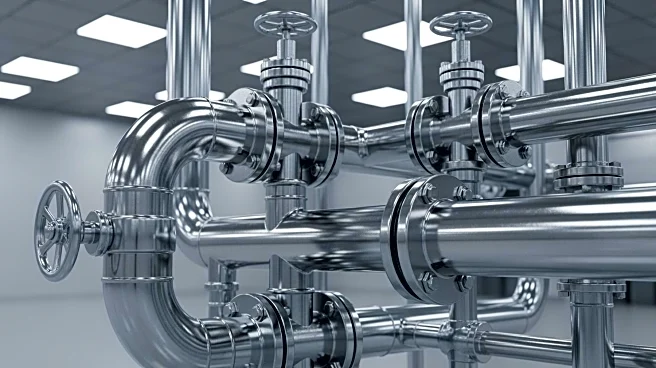What's Happening?
Kriti Industries India, a prominent manufacturer of polymer pipes, has announced a corporate restructuring initiative by approving the merger of its wholly owned subsidiary, Kriti Auto Engineering Plastics Private Limited, with itself. The decision was
made following recommendations from an audit committee and a board meeting held on November 8, 2025. The merger aims to simplify the group structure, achieve cost savings through rationalization and standardization of business processes, eliminate administrative duplication, reduce legal and regulatory compliance costs, and achieve economies of scale. The merger involves no cash consideration, simplifying the transaction and potentially reducing associated costs. Regulatory and statutory approvals are required before the amalgamation can be finalized.
Why It's Important?
The merger is significant for Kriti Industries as it aims to streamline operations and improve efficiency within the company. By consolidating its subsidiary, Kriti Industries expects to enhance resource allocation and potentially increase shareholder value. The move could lead to cost savings and improved business processes, which are crucial for maintaining competitiveness in the polymer pipe manufacturing industry. The merger reflects a strategic effort to optimize the company's structure and operations, potentially benefiting stakeholders through increased operational efficiency and reduced compliance costs.
What's Next?
The merger is subject to necessary regulatory and statutory approvals, which means shareholders and regulatory bodies must consent before the amalgamation can be finalized. This process will determine the timeline for the merger's completion. Stakeholders will be closely monitoring the approval process, as it will impact the company's future operations and strategic direction. The successful completion of the merger could set a precedent for similar corporate restructuring initiatives within the industry.
Beyond the Headlines
The merger highlights the growing trend of corporate consolidation in the manufacturing sector, driven by the need for operational efficiency and cost reduction. It raises questions about the long-term impact on employment and market competition, as companies streamline operations to remain competitive. The move also underscores the importance of regulatory compliance in corporate restructuring, as companies must navigate complex legal frameworks to achieve their strategic goals.
















